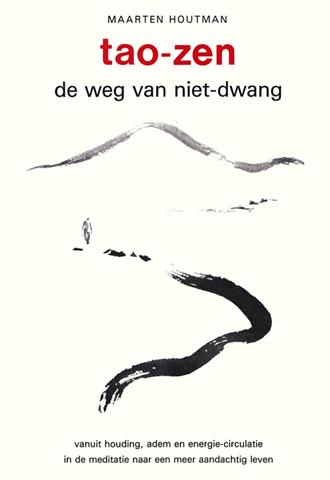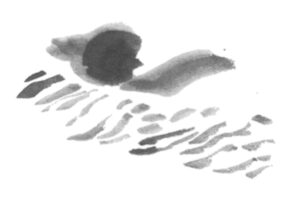Do you have difficulty with the exercise? Do you feel an obligation? Do you have to compel yourself? Accept everything, without censorship, and you will be in the heart of meditation Maarten Houtman

The following passages are taken from Maarten Houtman's book ‘Tao-zen, the way of non-compulsion’: INDEX · Where meditation begins · The evolution of self-awareness · The I-consciousness · Our situation · The urge to procreate and lovemaking · Summary
Where meditation begins
“Everything that you experience through your senses, i.e. in translation, is continually coming into being and perishing, at a pace ranging from barely perceptible to lightning fast. This difference in pace, throughout creation, has given us the distinction between living and dead.
What you arrive at via the senses in translation is the continually changing expression of the timeless ‘awareness’ that manifests itself continuously in time and space.
As soon as you realise that all your experiences arise from the expression of ‘awareness’ and are not ‘awareness’ itself, then your attention is focused inwards, towards the consciousness that also originates from ‘awareness’. Meditation is the undisturbed and undistracted state of being where ‘awareness’ becomes by transition its manifestation, without losing contact with what appears to the senses.
This silent sensation, being concentrated without will, connects you from ‘awareness’ with all that is manifested.
All exercises that are rooted in this knowledge help to create the situation in which this ‘becoming one’ can occur.”
The evolution of self-awareness
“Human consciousness is developing continually, indeed at an ever-increasing pace, due to the fact that we, in contrast with the animal kingdom, have the capacity to be aware of ourselves.
We don’t know how and when this self-awareness arose, although a more naive feeling of belonging to an incomprehensible whole can be identified in the Middle Ages.
Think of the anonymous builders and decorators of churches, of whom we sometimes know only the identity of the master mason, and whose name was drawn commonly from a district, place or profession.
However, the possibility to experience yourself as an autonomous individual, and to lead your life accordingly, has increased since the time of the Renaissance. We are only able to distinguish between the phenomena of life, to name them and hence compare and categorise them, because we can place ourselves outside these phenomena.
Whereas we, in contrast to animals, are able to perceive ourselves separately from all that is around us, at the same time we have become alienated from the cohesion with life.
We can control, use and manipulate the world, disregarding its cohesion.
We all know what science and technology have achieved. Nevertheless, it has only become clear in the last fifty years that the world we have labelled ignores the intrinsic value and cohesion of the phenomena of life. Ecological and environmental disasters, the exhaustion of natural resources as well as the damage we have caused to the atmosphere that protects the earth make clear that we have become alienated from the coherent world and the structure of creation.
Our self-awareness can only continue to evolve if we free ourselves from the dissociating and alienating side effect that currently accompanies our feeling of an independent individuality, an I.
We can free ourselves of this side effect by becoming fully aware of how the I-consciousness functions in its unconscious state.”

(illustration from the book)
The I-consciousness
“The destructive side effect of the I-consciousness, strengthened by the still incomplete self-awareness, results from the urge toward self-preservation of which we have remained similarly unaware.
The urge toward self-preservation, which drives animals to hunt for food and defend themselves when threatened, and the urge to procreate in order to secure the future of the species that completely takes over animals at certain times – these urges have, with regard to the I-consciousness, become a defence of the I, not just in physical and economic terms, but also psychologically and instinctively.
As long as the individual does not realise that everything he does, thinks, feels and strives for has an effect on the whole of which he is a part, he remains unconsciously and unintentionally a danger for the world.
In his I-consciousness he has created a defence that can take no account of the well-being of the whole.
In effect, you can only increasingly realise how this defence works, not just in the day but also during meditation, where it causes the division between what is inside and what is outside, while inside and outside are naturally one.
This realisation, or becoming aware, can only be brought about through a conscious effort. If, during this process, it is not clear from the start that the I plays a subordinate, but also an indispensable role in the exercise, then end and means become interchanged and performance and the pursuit of power can do their destructive work.”
Our situation
“It is evident from the above which stage in the evolution of awareness we have reached.
A radical change and new approach are needed to avert the disasters that threaten us.
Such a total change of awareness can only take place in the individual – society, culture and religion in different races and peoples are a reflection of the state of awareness of the individual.
On a large scale, the collection of forces appears to make it unrelenting and apparently irreversible, but the change in the individual is also a profound process, a mutation of the mind.
This mutation cannot be brought close by an effort of the will because this lacks the gentle persistence of insight – from insight the process of becoming aware can proceed undisturbed, even during illness, imprisonment or persecution and in other seemingly inescapable situations.
When exercising from insight, there is an absence of all haste or impatience, because you are aware of a process in a totality that you cannot comprehend, while what occurs is the only clear thing that you can work on here and now.”
The urge to procreate and lovemaking
“The urge to procreate, which is associated with an enormous sexual appetite, follows from the drive for self-preservation.
In the case of animals, this passionate lust only manifests itself at certain times (in season). Humans can experience this desire at any time. Because they have lost the relation with the whole, they may also want to experience it at any moment.
Many, including the founders of the major spiritual movements, have realised this, and their followers have distilled rules accordingly with which they try to exclude this lustful passion without going into the actual cause and its meaning.
This has led to asceticism, celibacy and other prohibitions that make it impossible to become aware of the all-embracing power of the communion.”
Summary
“From the above it is clear that you must become aware of the cosmic effects that are continuously acting on you, even though you are not aware of them because you occupy yourself with those things that are revealed in matter, which we call the world and other people.
You become aware of these cosmic effects in the posture, breathing and energy circulation exercises.
As you become aware and hence are increasingly more easily able to experience them, your attention shifts naturally to other matters, which are usually not visible.
Consequently, the world takes on an entirely different meaning for you
Be solely with yourself, quiet and attentive, absorbed in the Oneness.
From this Oneness, amongst people, work and the manifold activities that pass by and through you, you will remain in contact with it.”
< back to Tao-zen meditation